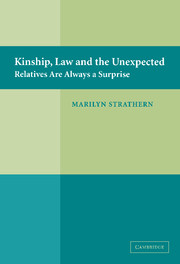Book contents
Introduction: The Arithmetic of Ownership
Published online by Cambridge University Press: 08 January 2010
Summary
I have been dealing with the impetus to kinship thinking provided by technologies that have confronted people with unprecedented explictness about relations where knowledge holds a key role. The people in question are heirs to the scientific revolution. Habits of knowledge already embedded (for Euro-Americans) in everyday practices are made visible, and then made visible again in regulation or legislation. That is what the Human Genetics Commission (HGC) was so concerned about.
Now the HGC documents mentioned in Part I largely confine children to specific chapters; children are treated first and foremost as minors, persons too young to give independent consent to medical treatment. Yet in another sense, the whole exercise is about children, that is, about offspring and what it means to be heirs of another kind, to a genetic inheritance. There would much less concern about human genetics if genetic information were not regarded as revealing inherited characteristics. The HGC generalises this when it says that one of the identifying features of genetic information is that it ‘is not only information about the individual person, but about his or her biological relations’ (HGC 2000: 7). However, although the text refers generally to issues that arise for family members, it is only in the context of children as young persons that it also deals explicitly with children as offspring.
Information
- Type
- Chapter
- Information
- Kinship, Law and the UnexpectedRelatives are Always a Surprise, pp. 81 - 91Publisher: Cambridge University PressPrint publication year: 2005
Accessibility standard: Unknown
Why this information is here
This section outlines the accessibility features of this content - including support for screen readers, full keyboard navigation and high-contrast display options. This may not be relevant for you.Accessibility Information
- 1
- Cited by
